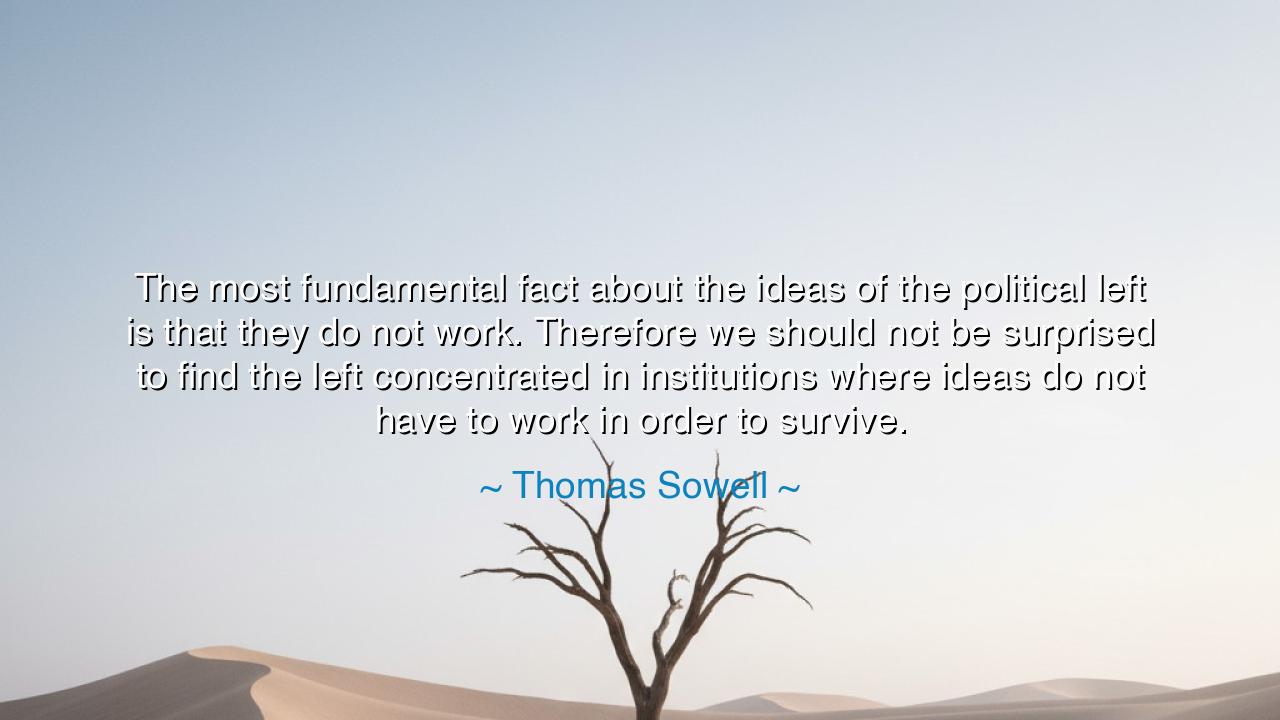
The most fundamental fact about the ideas of the political left
The most fundamental fact about the ideas of the political left is that they do not work. Therefore we should not be surprised to find the left concentrated in institutions where ideas do not have to work in order to survive.






The words of Thomas Sowell—“The most fundamental fact about the ideas of the political left is that they do not work. Therefore we should not be surprised to find the left concentrated in institutions where ideas do not have to work in order to survive”—strike with the force of a philosopher who has seen the rise and fall of many visions. They remind us that the test of any doctrine is not in its beauty on parchment, nor in its loftiness of speech, but in its power to endure in the world of sweat, struggle, and consequence.
The ancients knew this truth well. They taught that the worth of an idea lay in its fruit: whether it built order from chaos, justice from discord, abundance from want. Plato dreamed of perfect republics, but Aristotle counseled that laws must be practical, born of observation and bound to the soil of human weakness. Thus Sowell declares: noble intentions alone do not suffice—an idea must work in the crucible of reality, or it is but wind.
His words also reveal a warning: when doctrines fail in practice, they often flee to places where failure cannot be measured. In the halls of theory, in cloisters of debate, in certain institutions where survival is detached from reality, an idea may live on though it brings no harvest. This is the danger Sowell points to—that the left, as he critiques it, finds shelter in domains where results are not demanded, where work need not prove worth.
Yet within this critique lies a deeper teaching for all, whether left or right: do not mistake eloquence for truth, nor passion for proof. Every idea, however radiant, must be tested in the forge of life, against the hardness of human nature and the limits of the world. The ancients would have called this prudence—the noble discipline of binding vision to action.
So let this teaching endure: judge not an idea by its promise, but by its fruits. If it builds, if it heals, if it strengthens, then it is worthy. If it fails when set to work, cast it aside, lest it waste the labor and the hope of generations. For as the ancients taught and Sowell reminds us, wisdom is not in dreaming alone, but in creating order that truly endures in the fire of reality.






HMHieu Minh
Sowell's statement feels like an oversimplification. While it’s true that many left-leaning ideas have faced criticism for not producing immediate, tangible results, is it fair to completely dismiss them as 'not working'? Some of these ideas might take longer to fully materialize or could have effects that are harder to measure. Isn’t there value in ideas that aim to address systemic issues, even if they don’t provide instant solutions?
MN10CV2-26- Nguyen Minh Nhu
I’m intrigued by Sowell’s assertion that the left thrives in institutions where ideas don’t have to 'work.' It makes me wonder: is this a critique of academia and media, or a broader commentary on the nature of ideological movements? How do institutions like universities shape and promote ideas that don’t necessarily need to be pragmatic? Does this make the left more resistant to real-world challenges or more adaptable in theory?
HKHoang Hieu Kiem
Sowell’s statement brings attention to the tension between ideas and their real-world application. It raises the question: if political ideas on the left aren’t working in practice, why do they continue to gain traction? Are they simply idealistic or do they serve a purpose beyond immediate success? Also, is it possible that the institutions Sowell refers to—like universities or the media—are resistant to practical outcomes and instead value ideological consistency?
HMPham Thi Ha My
Thomas Sowell’s quote is a provocative critique of political ideologies, particularly the left. His claim that left-wing ideas 'do not work' is certainly controversial. But what does it mean for ideas to 'work' in politics? Is it about immediate results, or long-term consequences? What about the impact of ideas on social change, even if they don’t always lead to success in a conventional sense? Could the lack of practical success actually be a reason these ideas persist in certain institutions?